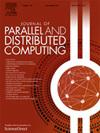MMBypass:利用自适应旁路网络实现高效的多模式人工智能计算
IF 3.4
3区 计算机科学
Q1 COMPUTER SCIENCE, THEORY & METHODS
引用次数: 0
摘要
多模态人工智能系统通过跨模态信息融合和处理机制,超越了传统的单模态架构,展现出卓越的性能。然而,与单模态架构相比,在多模态框架中处理异构数据流所需的计算复杂性增加了推理延迟。这一限制极大地限制了实时和大规模应用程序的部署可行性。为了应对这一挑战,我们提出了MMBypass,这是一种用于多模态人工智能加速的自适应高效架构。我们的解决方案通过自适应多模式任务的计算复杂性分析实现智能跳层机制,在保持预测准确性的同时减少延迟,并在特定场景中减轻模型过拟合。该体系结构的创新之处在于两个方面:1)在多模态网络中,我们为每个单模态网络设计旁路来进行自适应计算。2)设计了一个导流器来动态选择最优旁路。与现有方法不同,MMBypass方法保持了广泛的适用性,不需要特定领域的先决条件,并且在不同难度的数据样本上表现出明显更好的性能。经验评估表明,我们的架构实现了44.5%的平均延迟减少,同时在不同的多模式基准测试中达到或超过基线精度。本文章由计算机程序翻译,如有差异,请以英文原文为准。
MMBypass: Towards efficient multi-modal AI computing with adaptive bypass network
Multi-modal artificial intelligence systems demonstrate superior performance through cross-modal information fusion and processing mechanisms, surpassing conventional unimodal architectures. However, the enhanced computational complexity required for processing heterogeneous data streams in multi-modal frameworks results in elevated inference latency compared to their uni-modal architectures. This limitation significantly constrains deployment feasibility for real-time and large-scale applications. To address this challenge, we present MMBypass, an adaptive and efficient architecture for multi-modal AI acceleration. Our solution implements intelligent layer-skipping mechanisms through adaptive computational complexity analysis of multi-modal tasks, achieving latency reduction while maintaining predictive accuracy and mitigating model overfitting in specialized scenarios. The architecture's innovation lies in two aspects: 1) We design bypasses for each uni-modal network in multi-modal networks to perform adaptive computing. 2) We design a guider to dynamically choose the optimal bypasses. Distinct from existing methods, MMBypass maintains broad applicability without requiring domain-specific prerequisites, and it shows significantly better performance on data samples with different difficulties. Empirical evaluations demonstrate our architecture achieves 44.5% average latency reduction while matching or exceeding baseline accuracy across diverse multi-modal benchmarks.
求助全文
通过发布文献求助,成功后即可免费获取论文全文。
去求助
来源期刊

Journal of Parallel and Distributed Computing
工程技术-计算机:理论方法
CiteScore
10.30
自引率
2.60%
发文量
172
审稿时长
12 months
期刊介绍:
This international journal is directed to researchers, engineers, educators, managers, programmers, and users of computers who have particular interests in parallel processing and/or distributed computing.
The Journal of Parallel and Distributed Computing publishes original research papers and timely review articles on the theory, design, evaluation, and use of parallel and/or distributed computing systems. The journal also features special issues on these topics; again covering the full range from the design to the use of our targeted systems.
 求助内容:
求助内容: 应助结果提醒方式:
应助结果提醒方式:


